If you could protect your pool equipment from the corrosion process, would you? Better yet, can you? One of the leading concerns pool owners have when purchasing a salt system is whether or not it will corrode other pool equipment. But what if you could protect the metals in your pool from the harshness of the salt? Well, zinc anodes for swimming pools can do just that.
A large majority of pool owners aren’t familiar with zinc anodes. And to be honest, I wasn’t either. However, after doing my own research, I discovered the major benefits zinc anodes provide for swimming pools and pool equipment.
In this blog article, I explain what zinc anodes are, how they work, and how they benefit your pool when you install them correctly.
Why Use Zinc Anodes?
When you introduce salt into your pool, it converts into chlorine through electrolysis. This process occurs in every pool with a salt system. However, this process can also affect the metal parts of your other pool equipment and speed up the corrosion process.
In plain English, salt systems create a more corrosive environment for any metals found in your pool. This can include your pool ladder, steps, heater parts, above ground pool parts, light fixture housings, fittings, and any other metal part exposed to saltwater.
Pool owners can use a zinc anode to combat the corrosion of other critical metals in your pool. For example, if you electrically connect an anode to the metal you’re trying to protect, the corrosion caused by the electrolysis will attack the anode first. In a sense, the anode acts as a sacrifice to the more critical metal components. Zinc anodes have a more active voltage than other metals, therefore, it will erode instead of the other metals.

Types of Anodes
There are several types of anodes. For the most part, they differ by means of installation. The best way to determine which anode is best for you is to ask yourself, what specific metals are you trying to protect? Look at your pool’s needs and determine which anode installation makes the most sense.
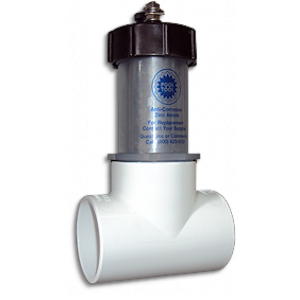 Inline Anode
Inline Anode
An inline anode is perfect if you are seeking to protect metal parts of your pump, filter, or heater core. Inline anodes mount directly to the metal filter or heater core. However, it does not matter where you place the anode, as long as you install it in the plumbing system to the bonding grid.
Most inline anodes come in 1.5″ or 2″ plumbing, making it versatile for almost any pool. Additionally, it includes clear PVC construction for easy inspections and also a weatherproof sticker for easy monitoring.
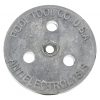
Anode Weight
The anode weight is perfect for preventing metal erosion or plaster discoloration due to electrolysis. The anode weight keeps the skimmer basket in place. It permanently bolts to the inside or outside of any skimmer basket. This method is one of the easiest and fastest ways to protect your pool equipment.
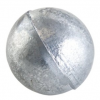
Anode Ball
The anode zinc balls work similar to the anode weights. To use, simply place the zinc ball in your skimmer basket. The zinc ball also helps weigh the skimmer basket down into place. Most zinc balls last between two and three years.
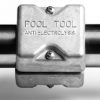 Bolt-on Type for Rails
Bolt-on Type for Rails
The anode that works best with above ground pool is the bolt-on type for railing. This type of anode eliminates plaster staining and metal corrosion caused by galvanic corrosion. To install, pool owners permanently bolt the anode to the ladder or grab rail below the water line. This is perfect for saltwater pools.
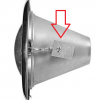 Zinc Anode for Pool Lighting
Zinc Anode for Pool Lighting
Anodes for pool lighting specifically protect metal or stainless steel lighting. In a poorly maintained pool or pool light that’s been sitting in salt for years, pool owners begin to see black staining around the pool light. The zinc anode for pool lighting prevents this. IT also prevents erosion of the stainless steel light, niche, and discoloration of the chrome faceplate.
One of the biggest complaints we see against salt systems is that it destroys the metal parts in your pool. Metal parts such as the face ring on your light, heat exchangers, and ladder treads and rails are most affected. If you are installing a salt system in your pool, we recommend considering a zinc anode. Whenever you introduce salt to metal for a prolonged period of time, you are bound to see corrosion. However, a pool with poor water chemistry is surely to speed up the corrosion process. Combatting corrosion starts with maintaining a balanced swimming pool. However, adding a zinc anode won’t hurt either!

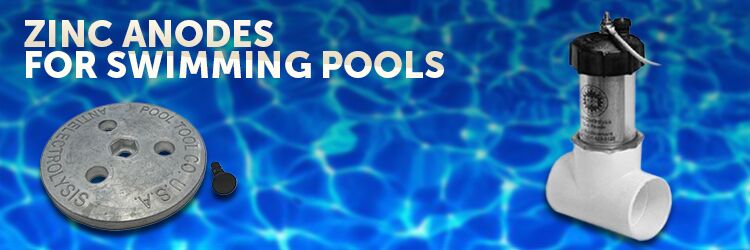






How can I tell how far my zinc anode is decayed? Does it change color? Does it get smaller? Does it look different in some other way?
The zinc anode starts to get eaten away by the corrosion. Eventually, it will become doll and craggy and may begin to fall apart.
How many 1 pond zinc ball anodes should I put into my skimmer basket?
One should be enough for a residential pool.
I have an regular inground pool, non salt, with discoloration on the tiles…I have no ladder or metal components other than the pool light that’s out & I dont know what to do about that. I have a zinc ball in the 1st filter basket, not the secondary… so according to whats posted, its doing nothing until I hook it up to something metal? Please bare with my “not knowingness”…lol
Why do you have a zinc ball in your skimmer if you’re not using salt? Have you checked to see what type of stains are forming? This will tell you how to treat them.
For more info – How To Identify A Pool Stain
My thoughts are that if a brass bonding clamp is attached to the metal piping and bonded to a zinc ground rod or any piece of zinc that is buried in the ground it would act as a sacrificial element as the electrons are given up more easily than the copper or steel. Aluminum oxides instantly creating an aluminum oxide coating that is highly resistant to corrosion. Many of these things that are dropped into the basket or inserted into the water without being bonded to metal parts seems nearly if not completely pointless.
Hello,
is there any video or detailed instructions on how to install a sacrificial anode?
Can and anode be used effectively in a DIY galvanized stock tank pool?
How often should this be replaced?
You should be able to track the decay zinc cartridge or brick so when it is on its last legs, you can have one on standby.
My question is: How do you tell if the zinc cartridge is decaying? Does it change color? Does it get smaller? Does it look different in some other way?
The zinc anode starts to get eaten away by the corrosion. Eventually, it will become doll and craggy and may begin to fall apart.
A sacrificial anode needs TWO things to work as intended. Firstly it must be electrically connected to the metal to be protected, or to the pool earth system AND in direct contact the pool water.
Attaching a zinc anode directly to a light fixture or ladder rung will work, provided both metals are submerged. Connecting an inline or other anode to the pool grounding system will also work, provided that the anode and other metal objects to be protected are submerged and electrically joined.
A loose anode, no matter where it is placed will not protect any other metals. It will over time dissolve slowly, but this is not an indication of protection at work, merely the natural reaction of zinc to a chemical solution (your pool).
This makes sense…I didn’t know a zinc anode just laying in the skimmer basket doesn’t do anything unless it’s attached to the bonding wire of the pool. I will have to change the way my anode is installed.
generally speaking, when your (above ground) pool is grounded, the waterbonding is done AT the skimmer, therefore the skimmer basket weights should work.
Can you place an in-line and a weight?
Which choice would work best? I like the drop in skimmer, easy. But will the inline work better?
The in-line zinc anode seems to be the most effective. The in-line method also allows you to attach a bonding wire.
To protect the SS nozzles from rust/corrosion, can we place zinc anode inside the pre-filter basket of the pump. Will it work?
I presume it would work, as it is downstream from the anode installation.
Hi,
I’ve read different things on the placement of the inline sacrificial anode. Any thought’s on this.
From the pump -> Filter -> Heat Pump -> Cholorine generator, my pvc is 2.25 diameter.
I’ve heard that it should go before the heater, but I don’t see any anodes that work with that diameter. On the other hand going into my pump, and coming out of my salt generator back to the pool, my pvc diameter is 2″.
Thanks
Vinnie
The best place for a saddle mounted zinc anode is between the filter and the heater. There are anodes with 1.5 and 2 inch designs; take a look at these: 1-1/2″ Plumbing (104c) – 104C-1, 2″ Plumbing – 104C-2
I just signed a contract on new salt water pool and looking for the hand rail and ladder. Will the skimmer basket method help prevent rust on the ladder and handrail?
The skimmer option is still an excellent choice to protect your railings. I’ve heard the most effective option is the bonded anode that mounts to your PVC plumbing.